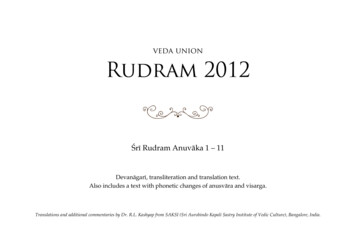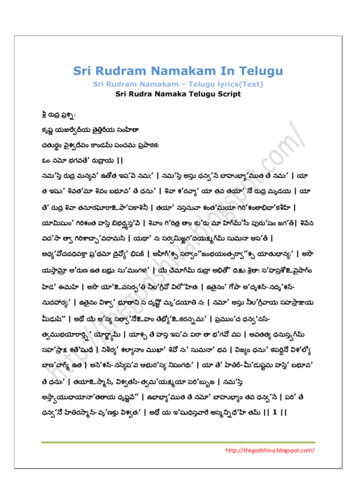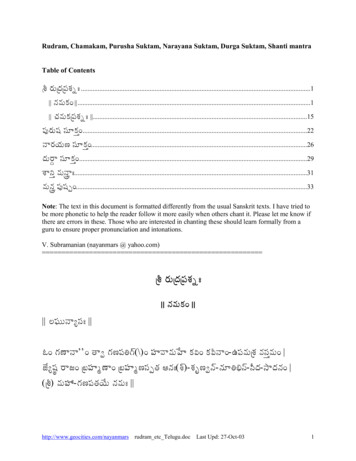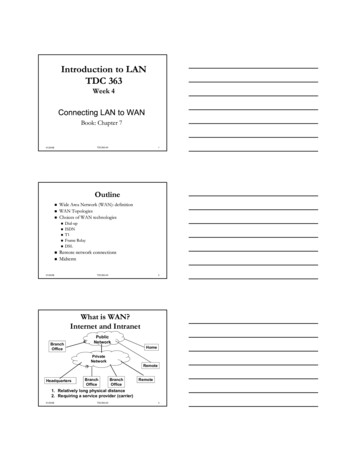
Transcription
veda unionRudram 2012Śrī Rudram Anuvāka 1 – 11Devanāgarī, transliteration and translation text.Also includes a text with phonetic changes of anusvāra and visarga.Translations and additional commentaries by Dr. R.L. Kashyap from SAKSI (Sri Aurobindo Kapali Sastry Institute of Vedic Culture), Bangalore, India.
Anuvāka 11 ि ॥5! ! % ि &' ।om namo bhagavate̍ rudrā̱ya śi̱vā śa̍ra̱vyā̍ yā tava̱ tayā̍ no rudra m&'aya Salutations to the God who is Rudra.And that your quiver which bears the blessing, by that you make us happy.2 ि ।6 ि ! # ( )* * ! , ।om nama̍ste rudra ma̱nyava̍ u̱tota̱ i!a̍ve̱ nama̍" yā te̍ rudra śi̱vā ta̱nūragho̱rā'pā̍pakāśinī Salutation to the one with righteous wrath (manyave), O Rudra, to your arrow salutationO Terrible One, that your body which is fair and full of kindness and destroys sin, not youralso.shape of terror,13 ।7 !- !" . !, / । nama̍ste astu̱ dhanva̍ne bā̱hubhyā̍mu̱ta te̱ nama̍" tayā̍ nasta̱nuvā̱ śanta̍mayā̱ giri̍śa tā̱bhicā̍kaśīhi Salutation to your bow and salutation to yours arms of might.2in that your body full of peace, you are wont to be seen (abhicākaśīhi) among our folk, Odweller in the mountain.34 ! ! " # ।8yā ta̱ i!u̍" śi̱vata̍mā śi̱va ba̱bhūva̍ te̱ dhanu̍" 1 । " !" / 0 yāmi!u ̍ giriśa ta̱ haste̱ bibha̱r!yasta̍ve That your arrow which is the kindliest of all and your bow which is auspicious.O Dweller in the mountains, the arrow you bear in your hand for hurling,1Bow (dhanu) symbolises the aim of action, the arrow symbolises the movement in action.manyu: righteous wrath; it is not the usual human quality of anger or wrath; it is Rudra's3force which is intolerant of defect and stumbling; it smites both the enemy and the loiterer.All the commentators associate Rudra of the Veda with the Puranic legends of Śiva such asRudra: one who removes (ra) the misery that causes crying; one who causes pain.dwelling in the Kailaśa mountain, getting a dark throat by drinking the hālāhala poison2dhanu: bow, that which provides the aim of action; arrow is the instrument.giriśanta: he who gives bliss (sham) staying in the mantra (gir); dweller in the mountain.etc. All these legends are symbols whose meanings are clarified at the relevant places here.2 / 40
Śrī Rudram9Anuvāka 1" 3 * " 5 ।3! " ऽ " / 4, /, @ 3 4 1̎B C D 1̎@ ।śi̱vā gi̍ritra̱ tā ku̍ru̱ mā hig ̍sī̱" puru̍!a ̱ jaga̍t ahīg̍śca̱ sarvā̎ñja̱mbhaya̱ntsarvā̎śca yātudhā̱nya̍" make an arrow for blessing (śivam), O Keeper of the hills, let it not slay my armed men.destroying all the (inner) psychological foes and all demon-sorceries.410! .4 6 ! 7 8 4 ।13 4E ॆ G ॅI 4 JK ।śi̱vena̱ vaca̍sā tvā̱ giri̱śācchā̍vadāmasi a̱sau yastā̱mro a̍ru̱-a u̱ta ba̱bhru" su̍ma̱.gala̍" With fair speech, O Mountain-dweller, we appeal to you directly (acchā),This Aru3a of the dawn that is tawny (babhru), copper-red (tāmra) and auspicious,113 4 ।3 9 4 1 : 8 ; " 414 . " 3 ि 8 L ौ I 4/ॐ ! ) ? " /3 ' O / ।yathā̍ na̱" sarva̱mijjaga̍daya̱k!mag su̱manā̱ asa̍t ye ce̱māg ru̱drā a̱bhito̍ di̱k!u śri̱tā" sa̍hasra̱śo'vai̍!ā̱g ̱that the whole world may be for us a friendly and healthy (ayak2mam) place.he'a̍ īmahe and these violent ones (rudrās) that dwell in their thousands, we want to avert (ava īmahe)12 .8 ू9 8?% 3 ।their wrath.5adhya̍vocadadhiva̱ktā pra̍tha̱mo daivyo̍ bhi̱!ak One who guides the speech (adhivaktā), the first divine healer (of fears), has givencommands in our favour,4ahi: serpent-demon, symbolises foes of the vital nature like greed, jealousy, excessivesexual desire etc.bhi2ak: healer, one who frees us from fears.5The first part refers to the Sunrise or the dawn of the spiritual light; along with the eventare released several forces (rudrās) whom we disregard although unconsciously. The prayeris may their wrath not effect us.3 / 40
Śrī RudramAnuvāka 1 4E ) 4* 1 ,Kम, K / I ।18a̱sau yo̍'va̱sarpa̍ti̱ nīla̍grīvo̱ vilo̍hita" atho̱ ye a̍sya̱ sattvā̍no̱'ha tebhyo̍'kara̱nnama̍" Him who goes away quickly, one with blue rays and scarlet-hued,and to those that are his warriors I have offered (akaram) my salutation.15 1 । ? " * Q! RQ!R8/ 19 9 V 4W )/" ) R ।ू X Y Z1 [ 1 ।3u̱taina ̍ go̱pā a̍d&śa̱nnad&̍śannudahā̱rya̍" pramu̍ñca̱ dhanva̍na̱stvamu̱bhayo̱rārtni̍ yo̱rjyām Him the keepers of cows and the bearers of water (udahārya7) have seen,Release the string (jyām) of the bow (dhanvan) from its both ends (ārtniyo7),16 ? " S # 4 Q T &' I ।20 @ / * * ।u̱taina ̱ viśvā̍ bhū̱tāni̱ sa d&̱!/o m&̍'ayāti na" yāśca̍ te̱ hasta̱ i!a̍va̱" parā̱ tā bha̍gavo vapa and him all creatures (have seen); may he, seen, be gracious to us.6and drop down (parāvapa) the arrows in your hand, O Bhagavān.817 ,Kम, 4/ॐ L , U ̎ ।213 ॐ L ! । " 4/ \ Ynamo̍ astu̱ nīla̍grīvāya sahasrā̱k!āya̍ mī̱'hu!e̎ a̱va̱tatya̱ dhanu̱stvag saha̍srāk!a̱ śate̍!udhe Salutation to the blue-necked, thousand-eyed one, the bountiful,7May you, of a thousand eyes and a hundred quivers, unstring your bow,6The first line refers to the setting Sun. At this auspicious moment many ordinary personslike cowherds and the maidens who carry the water have seen the form of Rudra for aninstant only; hence the phrase 'goes away quickly' (avasarpati, creeps away).nīlagrīva: one with blue (nīla) rays (grīva), an aspect of setting Sun.7neck. Every part of the body of Rudra represents an aspect of this universe. Shiva localisesnīlagrīva: one with blue neck; an aspect of the Rudra seen in the vision. The blue neckthe poison so that it may not effect any other part of Universe.symbolises all the poisons of the world which are absorbed by Rudra and localised in his84 / 40The prayer is for the lord for not using his bow by making it ineffective.
Śrī RudramAnuvāka 1 । )c 3 S Y ; * d5 ! 4 । !, 1 ! ] " ni̱śīrya̍ śa̱lyānā̱ mukhā̍ śi̱vo na̍" su̱manā̍ bhava tayā̱'smān vi̱śvata̱stvama̍ya̱k!mayā̱ pari̍bbhuja and destroy the (the sharp metallic) points of your arrows; be auspicious and right-mindedwith them do you guard us on all sides, free from sickness (ayak2hma).10to us.25 [" * 8 !] G " 3 ।22 Y & e ̎ ।nama̍ste a̱stvāyu̍dhā̱yānā̍tatāya dh&̱!-ave̎ vijya ̱ dhanu̍" kapa̱rdino̱ viśa̍lyo̱ bā-a̍vāg u̱ta Salutation to your weapon which is relaxed (anātatāya) and potent (dh 2h3ave),11Unstrung is the bow of him of the braided hair and arrowless his quiver,92623 !R V V " 9 । " ।u̱bhābhyā̍mu̱ta te̱ namo̍ bā̱hubhyā̱ tava̱ dhanva̍ne ane̍śanna̱sye!a̍va ā̱bhura̍sya ni!a ̱gathi̍" and salutation to your hands and to your bow.his arrows have departed (or are unseen), empty is his quiver (ni2hangathi7).2724 / abUT / # ।* / c &G S ।pari̍ te̱ dhanva̍no he̱tira̱smānv&̍-aktu vi̱śvata̍" yā te̍ he̱tirmī̍'hu!/ama̱ haste̍ ba̱bhūva̍ te̱ dhanu̍" May the missile (heti) from your bow avoid us on every side.O Most Bountiful One (mi;hu2h ama), the missile (heti) that is in your hand and yourbow,109kapardin: one with braided hair or fear-causing appearance; refers to the person of RudraThe phrase ayak2hma clearly indicates that the Rudra is protecting us from thepsychological foes who cause sickness.in the vision.115 / 40anātatāya: that which is not aimed.
Śrī RudramAnuvāka 13 9 c R / ॥atho̱ ya i̍!u̱dhistavā̱re a̱smannidhe̍hi̱ tam Indeed, loosen (nidhehi) your quiver and keep it far-away (āre) from us.28 ऽ h K 3 SS / 8 fg ऽ* - 4 kS 48 ! ौ, l/ 8 ॥ K h ि ,K ij &\Bnama̍ste astu bhagavan viśveśva̱rāya̍ mahāde̱vāya̍tryamba̱kāya̍ tripurānta̱kāya̍ trikāgnikā̱lāya̍kālāgniru̱drāya̍ nīlaka̱-/hāya̍ m&tyuñja̱yāya̍ sarveśva̱rāya̍sadāśi̱vāya̍ śrīmanmahāde̱vāya̱ nama̍" I offer my salutations (namaste) to Lord Shiva: who is the Lord of the Universe(viśveśvarā); who is the great God (mahā-devā); who has three eyes (tryambakā); who is theannihilator of Tripura – the city of the demon; Tripura also represents our ego (tripuraantaka); who is the master of sacrificial fire of three kinds (trikāgnikālāya); who is theRudra who consumes everything as the fire of kāla -agni at the time of destruction; Onewhose throat is blue (nīla-ka3 hā); who is the conqueror of death (m tyuñjayā); who is theLord of all (sarveśvara); who is always auspicious (sadā-śiva). Salutations to Rudra who isthe celebrated and great God (śrīman-mahādevā).1212Source: “Vedic chants – The journey within”6 / 40
Anuvāka 21 / i / 4 8 ! " . * 4 n ! % )R " * namo̱ hira̍-yabāhave senā̱nye̍ di̱śā ca̱namo̍ babhlu̱śāya̍ vivyā̱dhine'nnā̍nā̱ pata̍ye̱ namo̱pata̍ye̱ namo̱Salutation to the golden-armed leader of the armies, and to the lord of the quartersSalutation to the brown one, to the piercer, to the lord of food, salutation!16salutation!1352 & L / ! I *!# " * namo̱ hari̍keśāyopavī̱tine̍ pu̱!/ānā̱ namo̍ v&̱k!ebhyo̱ hari̍keśebhya" paśū̱nā pata̍ye̱ namo̱pata̍ye̱ namo̱Salutation to the trees with green tresses, to the lord of all beings salutation!3 / ! * , * T " * Salutation to the one with eternal youth, who has come for the advent (upavīta), to the lordof nourishment (pu2h i) salutation!1714 4 mB 6 , *9, " * nama̍" sa̱spiñja̍rāya̱ tvi!ī̍mate pathī̱nā pata̍ye̱ namo̱15saspi: a class of demons; tender grass; we have preferred the first meaning so that all thethree epithets have some connection with one another.Salutation to the one who destroys the foes (saspi) (in the path), to the radiant, to the lordpathi: paths leading to immortality (am tatva).of paths salutation!1516babhlusha: the brown one; one who rides on the bull (babhru); the bull symbolises theshower or diffusion of energies.anna: food, all that is taken in by both organs like mouth and the senses.13hira3ya: that in which the delight (ra3) is hidden (hi); usually translated as gold.17harikesha: one with eternal youth.golden armed: gold represents the delight or light beyond the mind. His strengthpu2h a: there are ten powers of nourishment like speech, knowledge, health and keeness ofsymbolised by his arm is luminous.sense organs, riches, children, cattle, flourishing villages, dominance of dharma, the eight14pashu: all beings including humans, animal etc.occult powers, house, both external and internal.v k2ha: that which covers (v ) the earth.upavīta: one who is here (upa) for advent or manifestation (vīta); sacred thread.7 / 40
Śrī RudramAnuvāka 2 V / \ ? 5 " * 9 qG G 5 L G " * namo̍ bha̱vasya̍ he̱tyai jaga̍tā̱ pata̍ye̱ namo̱namo̍ ma̱ntri-e̍ vā-i̱jāya̱ kak!ā̍-ā̱ pata̍ye̱ namo̱Salutation to the dart of Bhava, to the lord of the moving world salutation!18Salutation to the lord of mantras, the bringer of valuables (trader), to the lord of secretssalutation!226 ि Lऽ G " * 10namo̍ ru̱drāyā̍tatā̱vine̱ k!etrā̍-ā̱ pata̍ye̱ namo̱ " r& E , " * namo̍ bhuva̱ taye̍ vārivask&̱tāyau!a̍dhīnā̱ pata̍ye̱ namo̱Salutation to Rudra with the stretched (ātata) bow, to the protector of bodies salutation!19Salutation to the extender of the world, the creator of riches, to the lord of herbs7salutation!23 4# /o " * nama̍" sū̱tāyāha̍ntyāya̱ vanā̍nā̱ pata̍ye̱ namo̱11Salutation to the charioteer, the inviolate (ahantyāya), to the lord of the delight s ?(tb ब v *w, *3 nama̍ u̱ccairgho̍!āyākra̱ndaya̍te pattī̱nāmsalutation!20pata̍ye̱ namo̱8 / p * & L G" * Salutation to the loud praise (of devotees), the screaming (of foes), to the lord of footsoldiers salutation!24namo̱ rohi̍tāya stha̱pata̍ye v&̱k!ā-a̱ pata̍ye̱ namo̱Salutation to the ruddy one, the ruler, to the lord of woods salutation!2121rohita: one who bestows (hita) the grace or speech (ra).22kak2ha: impenetrable regions; (Rudra protects the creatures there;), secret knowledge;mantri3e: lord of all mantrās; minister.18bhava: lord of all becomings including the many lives of humans.trader: it is a simile; just as a trader makes accessible the valuable things from remote19With his bow he protects all in the right path.places Rudra makes the secret knowledge accessible to human beings.20sūta: charioteer (of all beings).23vārivask t: creator of wealth (variva), one who serves (variva) (the devotees).24ākrandayate: screaming (of the foes fleeing in terror).vana: delight, wood.8 / 40
Śrī Rudram12Anuvāka 2 & x , 4W " * ॥nama̍" k&tsnavī̱tāya̱ dhāva̍te̱ sattva̍nā̱ pata̍ye̱ nama̍" Salutation to the one who manifests (vītāya) in everything, to the one who is eager (orruns), to the lord of good people (satvanām) salutation!25All the three epithets are connected; even with foot soldiers Rudra makes the foes flee andaccept the loud praise of grateful devotees.25dhāvate: one who runs, one who is eager to help the devotees or to attain perfection.vītaye: for the advent, manifestation, enjoyment etc.; occurs in many places of Eg Veda.9 / 40
Anuvāka 31 4/ % 8 % , " * 4 X * X # " * nama̱" saha̍mānāya nivyā̱dina̍ āvyā̱dhinī̍nā̱ pata̍ye̱ namo̱namo̱ vañca̍te pari̱vañca̍te stāyū̱nā Salutation to the strong, to the one who strikes repeatedly, to the lord of assailers (of foes)pata̍ye̱ namo̱salutation!262Salutation to the cheater, the swindler, to the lord of burglars salutation!29 JG̎ " * 5nama̍" kaku̱bhāya̍ ni!a̱.gi-e̎ ste̱nānā̱ namo̍ nice̱rave̍ parica̱rāyār
Rudram 2012 Śrī Rudram Anuvāka 1 – 11 Devanāgarī, transliteration and translation text. Also includes a text with phonetic changes of anusvāra and visarga. Translations and additional commentaries by Dr. R.L. Kashyap from SAKSI (Sri Aurobindo Kapali Sastry Institute of Vedic Culture), Bangalore, India.File Size: 306KBPage Count: 40











